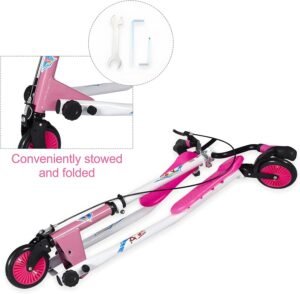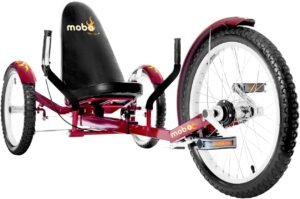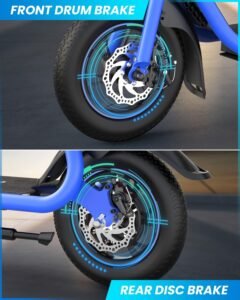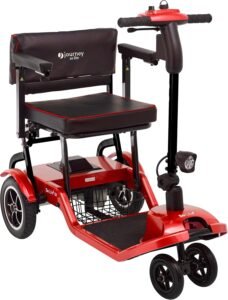
Are you ready to embark on an exciting new adventure? Look no further! In this article, “Scooter Riding Made Easy: Follow This Guide,” we will take you through a step-by-step journey to help you become a confident and skilled scooter rider. Whether you’re a beginner or looking to enhance your existing skills, this guide has got you covered. Get ready to navigate the streets with ease and enjoy the thrill of the open road on your very own scooter. So, grab your helmet, put on a smile, and let’s get started on this exhilarating ride!

This image is property of images.unsplash.com.
Check out our product reviews!
Choosing the Right Scooter
When it comes to choosing the right scooter, there are several factors to consider. First and foremost, you need to know your scooter options. There are various types of scooters available in the market, including electric scooters, kick scooters, and gas-powered scooters. Each type has its own advantages and disadvantages, so you need to choose one that suits your needs and preferences.
Once you have decided on the type of scooter you want, it is important to consider your riding preferences. Are you planning to use the scooter for commuting short distances or for recreational purposes? This will help you determine the features and specifications you need in a scooter. For example, if you plan to use the scooter for a long commute, you may want to consider a scooter with a longer battery life or a scooter with a larger gas tank.
Another important factor to consider when choosing the right scooter is the size. Scooters come in different sizes, so it is important to select one that is appropriate for your height and weight. A scooter that is too small or too large can be uncomfortable and can affect your balance and control while riding.
Finally, you should check for safety features when choosing a scooter. Look for scooters with features like sturdy brakes, headlights, taillights, and reflectors to ensure maximum safety while riding. Additionally, consider scooters that offer stability and control features such as anti-slip foot decks and adjustable handlebars.
Learning the Basics
Before you start riding your scooter, it is important to learn the basics of scooter riding. This will help you build a strong foundation and ensure a safe and enjoyable riding experience.
First and foremost, always wear the right safety gear when riding a scooter. This includes a helmet, knee and elbow pads, and sturdy shoes. Wearing the right safety gear will protect you in case of any accidents or falls.
Next, start your scooter on level ground. This will make it easier to find your balance and control the scooter. Before you start riding, make sure you are comfortable and confident standing on the scooter.
Finding your balance is crucial while riding a scooter. Stand on the scooter with your feet shoulder-width apart and distribute your weight evenly. This will help you maintain stability and control while riding.
As you become more comfortable with standing on the scooter and finding your balance, practice braking. Knowing how to brake properly and smoothly is essential for your safety and the safety of others. Gradually apply the brakes to slow down and come to a complete stop.
Once you have mastered the basics of scooter riding, it’s time to learn how to turn. To turn, simply lean in the direction you want to go and use your body weight to initiate the turn. Practice turning in a wide area to get familiar with the movement and control of the scooter.

This image is property of images.unsplash.com.
Check out our product reviews!
Mounting and Dismounting
Mounting and dismounting a scooter properly is crucial for a safe and smooth ride. Follow these steps to mount and dismount your scooter correctly:
- Stand next to the scooter with the scooter deck facing you.
- Place one foot on the scooter deck, near the center.
- Push off with your other foot to gain momentum and kick start the scooter.
- Once you are moving, place your other foot on the scooter deck and find your balance.
- To get off the scooter, slow down gradually and come to a complete stop.
- Stand on one foot while lowering the other foot to the ground.
- Maintain your balance and step off the scooter smoothly and safely.
Remember to always be cautious and alert while mounting and dismounting your scooter. Take your time and make sure you have complete control before you start or end your ride.
Understanding Acceleration and Deceleration
Understanding how to accelerate and decelerate properly is essential for a smooth and controlled ride. Here are some tips to help you master acceleration and deceleration on your scooter:
When accelerating, gently apply throttle. Gradually increase the speed by slowly twisting the throttle. This will help you maintain control and prevent any sudden jerks or unsteady movements.
When you need to slow down or stop, release the throttle gradually. This will allow the scooter to decelerate smoothly and give you more control over your speed. Avoid abruptly letting go of the throttle, as it can lead to sudden and unsafe movements.
It is important to avoid abrupt movements while riding a scooter. Sudden acceleration or deceleration can throw off your balance and control, increasing the risk of accidents or falls. Always aim for smooth and gradual movements to ensure a safe and enjoyable ride.

This image is property of images.unsplash.com.
Navigating Obstacles
Encountering obstacles while riding a scooter is inevitable, so it is important to know how to navigate them safely. Here are some tips to help you maneuver around obstacles:
Approach obstacles slowly and with caution. This will give you enough time to assess the obstacle and plan your route around it. Riding at a reasonable speed will also allow you to react quickly if any unexpected obstacles appear.
Proper body positioning is key when navigating obstacles. Keep your body centered and your weight evenly distributed to maintain balance and control. Leaning too far forward or backward can affect your ability to maneuver around obstacles safely.
Practice maneuvering around obstacles in a controlled environment. Set up cones or other objects to simulate different obstacles and practice avoiding them. This will help you build confidence and improve your ability to navigate obstacles effectively.
Sharing the Road
When riding a scooter, it is important to share the road responsibly and safely. Here are some guidelines to follow:
Obey traffic laws and signals, just like you would when driving a car or riding a bicycle. This includes stopping at red lights and stop signs, yielding to pedestrians, and using hand signals to indicate your intentions.
Whenever possible, ride your scooter in designated bike lanes or paths. This will help ensure your safety and minimize conflicts with other vehicles on the road. If there are no bike lanes or paths available, ride as close to the right side of the road as possible, following the flow of traffic.
Stay visible to other road users by wearing bright or reflective clothing and using lights when riding at night. Additionally, use hand signals to indicate your turns and intentions, allowing others to anticipate your movements.
Always be aware of your surroundings and anticipate the actions of other road users. Keep a safe distance from cars and other vehicles, and avoid riding in blind spots. By staying alert and predictable, you can greatly reduce the risk of accidents and collisions.
Handling Different Terrains
Scooters can be ridden on various terrains, so it is important to know how to handle different surfaces. Here are some tips for riding on different terrains:
When riding on smooth pavements, maintain a comfortable speed and be cautious of any potential hazards such as potholes or debris. Smooth pavements allow for a relatively easy and smooth ride, so enjoy the experience and make sure to follow all safety guidelines.
Bumpy surfaces require extra caution and control. Keep a firm grip on the handlebars, bend your knees slightly, and distribute your weight to absorb the impact of the bumps. Slow down if necessary to maintain stability and control.
Navigating downhill or uphill can be challenging, especially if the terrain is steep. When going downhill, keep your speed in check and use the brakes as needed to maintain control. When navigating uphill, use a combination of throttle and body positioning to tackle the incline steadily and safely. Maintain a steady speed and avoid sudden stops or changes in speed.
Dealing with Traffic
Riding a scooter in traffic requires extra caution and awareness. Here are some tips to help you navigate traffic safely:
Stay alert and always be aware of your surroundings. Keep an eye on other vehicles, pedestrians, and potential hazards. Stay focused and avoid distractions such as using your phone while riding.
Maintain a reasonable speed that allows you to keep up with the flow of traffic. Riding too fast or too slow can increase the risk of accidents and create a hazard for other road users.
Use mirrors and perform shoulder checks regularly to check for vehicles approaching from behind or in your blind spots. This will help you make informed decisions and avoid any sudden movements that could surprise or confuse other drivers.
Signal your intentions by using hand signals or turn signals when changing lanes or making turns. This will communicate your intentions to other road users and allow them to adjust their driving accordingly.
Maintaining Your Scooter
Proper maintenance is essential to keep your scooter in good working condition and ensure a safe ride. Here are some maintenance tips to follow:
Regularly check the tire pressure of your scooter to ensure optimal performance. Properly inflated tires provide better traction and control, making your ride safer and more enjoyable.
Inspect the brakes and lights of your scooter regularly. Make sure the brakes are functioning properly and the lights are working correctly. Faulty brakes or lights can compromise your safety and increase the risk of accidents.
Keep the battery charged at all times, especially if you have an electric scooter. A fully charged battery ensures a longer ride time and prevents unexpected battery failures during your journey.
Clean and lubricate your scooter regularly to prevent build-up of dirt and debris. This will help maintain the performance and longevity of your scooter. Refer to the manufacturer’s guidelines for the appropriate cleaning and lubricating products to use.
Advanced Techniques
Once you have mastered the basics of scooter riding, you may want to explore advanced techniques to enhance your skills and challenge yourself. Here are some advanced techniques you can consider:
Mastering sharp turns requires finesse and control. Practice leaning into turns and maintaining your balance while making quick and tight turns. Start with wider turns and gradually decrease the turning radius as you become more confident.
Performing wheelies and stunts should only be attempted by experienced riders in controlled environments. Wheelies can be dangerous and should be done cautiously, using proper technique and safety precautions. Always prioritize your safety and adhere to local laws and regulations.
Improving speed and control can be achieved through practice and patience. Gradually increase your speed while riding in a safe and controlled environment. Focus on maintaining balance and control at higher speeds. Remember to always prioritize safety over speed and never exceed your limits.
By following these guidelines and practicing regularly, you can become a confident and skilled scooter rider. Enjoy the freedom and excitement of riding a scooter while prioritizing safety and responsible riding. Stay alert, follow the rules of the road, and always be mindful of your surroundings. Happy scootering!















